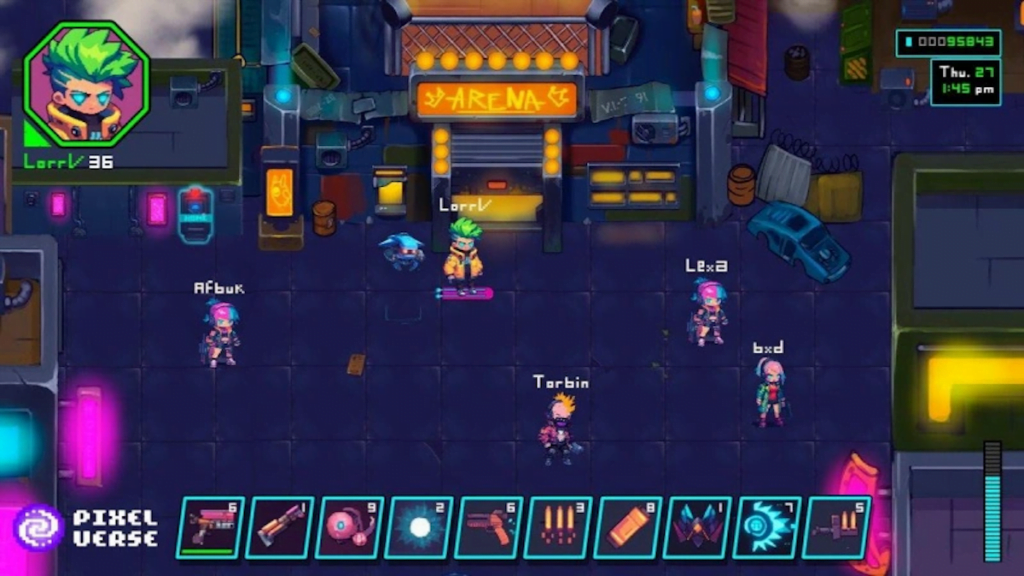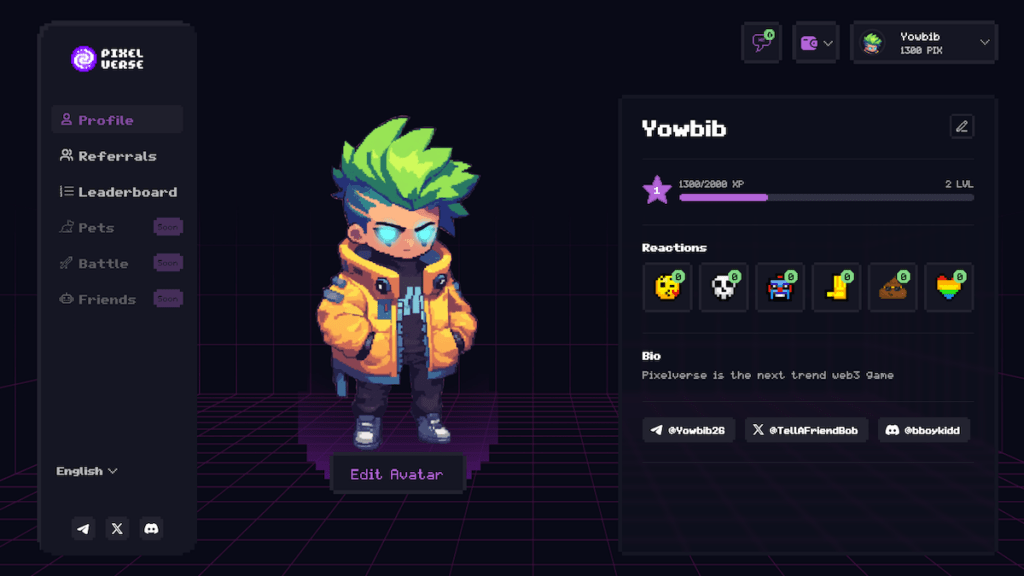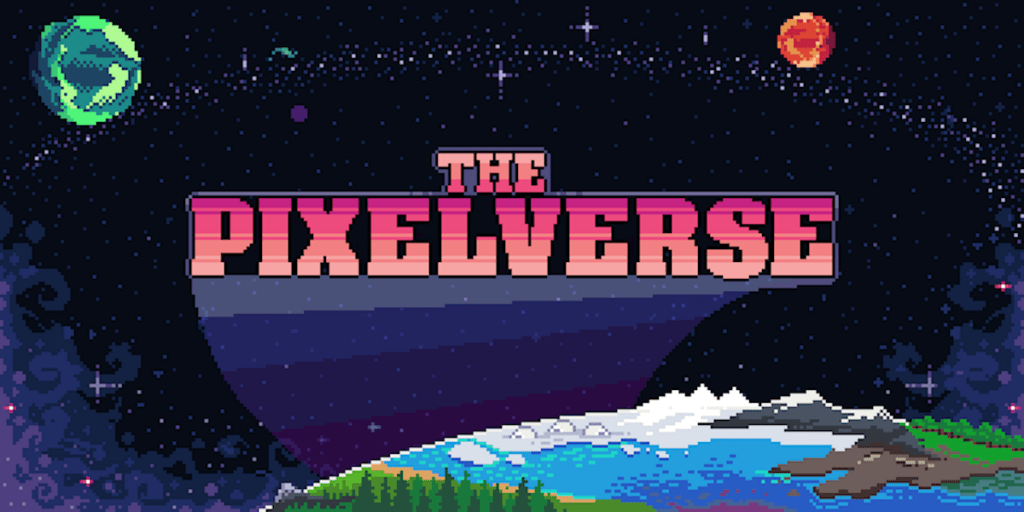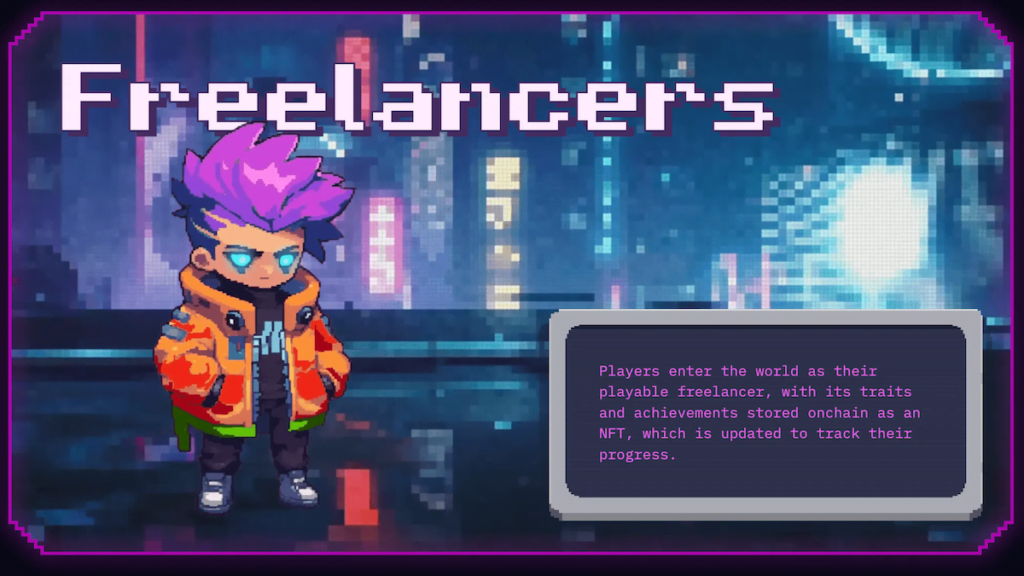Did you ever imagine being fully immersed in a cyberpunk saga, pixel by pixel? The concept of a metaverse may be familiar, but the Pixelverse takes this virtual experience back to the nostalgic era of 2D gaming. Kirill Volgin, the visionary behind this creative fusion, redefines immersive gaming within a comprehensive and eye-catching pixelated universe.
The Pixelverse isn’t your average throwback to the classics—it’s an intersection where a passionate community, narrative depth, and innovative technology converge. As we dive into the backgrounds of its cyberpunk worlds, anticipate a blend of engaging quests, role-playing elements, and competitive thrills that promise to keep you on the edge of your seat. What sets Pixelverse apart is its commitment to leveraging emerging technologies like blockchain, opening doors to new ways of gaming and player interaction.
Prepare to join an active user base, interact with secure platforms, and explore a vast array of game features that keep the universe pulsating with life. From Deck Heroes to digital trading cards, this game offers a multifaceted experience. As you gear up for the upcoming launch, let’s embark on a preview voyage through The Pixelverse Chronicles, where gaming meets groundbreaking tech and community spirit reigns supreme.
Background of the Pixelverse Game
Pixelverse stands as a true innovation in the gaming space, weaving a tale that transports players into the cyberpunk world of Xenon. Imagine a backdrop where high-tech meets low life—a place thrumming with life and potential dangers at every turn. This is the vision that Kirill Volgin, the former CEO of Step App, is bringing to life. Volgin, who led Step App to an astounding $3.85 billion in volume in the first couple of weeks of its launch, holds the reins to this project, infusing it with his deep experience in web3 and gaming.
Pixelverse is not just another game; it is a universe built atop the robust foundations of the Pixelverse SDK, powered by Pixelchain. This ensures that players enjoy low-cost transactions and seamless integrations with third-party products, enhancing the overall gaming experience. Moreover, the Alpha release on the Pixelverse Playground in April hints at a structured approach designed to draw in both seasoned web3 users and those new to the digital landscape.
Overview of the Game
Pixelverse encapsulates a gaming experience that is both cool and complex. Set in the pixelated cyberpunk universe of Xenon, the game opens up a myriad of quests, PvE battles, bot crafting, and fierce arena combats. It is a card game where collecting NFT items is just the tip of the iceberg. Players must engage in game activities that focus on merging and upgrading bots, creating formidable battlers for the arena.
In a twist that amps up the thrill, Pixelverse rewards players based on the risks they undertake, introducing a ‘Risk to Earn’ model that is a game-changer. By staking tokens on themselves, players can win big, adding an alluring competitive edge. With strategic use of cutting-edge blockchain technology, Pixelverse ensures that these activities are not only engaging but also cost-effective for users to partake in.
Kirill Volgin and his Vision
Under Kirill Volgin’s leadership, Pixelverse is positioned to make a seismic impact in the Web3 Gaming space. Bringing a history of impressive innovation and expertise, Volgin has conceptualized a game that interlaces captivating storytelling with blockchain’s economic possibilities. His ‘Risk to Earn’ model is poised to redefine what it means to be an ultimate battler in digital gaming.
Volgin’s strategy is centered around community engagement and rewarding early backers. The game’s launch on Raiser.co is a testament to this philosophy—promising more than just game currency and assets, but an active userbase that is integral to the game economics. Alongside Volgin is CMO Mahamadou Cissé, whose experience ensures that Pixelverse’s release and subsequent activities are in expert hands.
The Immersive Cyberpunk Universe
The planet Xenon is a cyberpunk canvas ready for players to leave their mark. Once a formidable prison, it now stands as a symbol of freedom where humans and AI converge. In this setting, players collect rare game items, craft sophisticated bots, and quest through a narrative-driven landscape.
As a digital domain brimming with freelancers and bots, Xenon transforms in-game assets into NFTs stored on-chain, flaunting the prowess of Pixelchain. The Pixelverse SDK is the backbone, making in-game transactions a breeze and facilitating collaborations with other gaming titles and platforms. It is this fusion of setting, story, and technology that shapes Xenon into an immersive place of adventure and opportunity.
Here, every corner turned reveals a piece of the Pixelverse narrative, inviting players to dive deeper into its many layers and leave their mark in the annals of this virtual universe.
Gameplay
At the heart of Pixelverse lies a gameplay environment where strategy, storytelling, and competition intersect seamlessly. Players are tasked with collecting rare items that enable them to craft unique bots, which can then be upgraded and merged to create dominant forces within the game’s arena. Venturing through the pixelated streets of the cyberpunk world of Xenon, every player takes an active role in the unfolding narrative, embracing PvE quests that not only challenge but also enrich their digital experience.
The game stands out through its Risk to Earn model, boldly rewarding players based on the stakes they set on their own in-game performance. This competitive twist ensures that the level of risk players choose to take correlates directly to potential gains, all while fostering an environment of strategic gameplay. With the integration of NFT items and the Pixelchain technology, transactions within Pixelverse are streamlined, epitomizing efficiency and cost-effectiveness which are vital for maintaining the dynamism and fast-paced nature of the cyberpunk universe.
Narrative-driven Quests
Diving into Pixelverse, players will find themselves in Xenon, a world where narrative-driven quests take center stage. These quests are woven into the fabric of gameplay, ensuring that every PvE battle and item collected adds depth and richness to the player’s journey. As players traverse this intricate digital landscape, they carve out their own paths, training and upgrading unique bots that are pivotal in arena battles.
Every narrative quest offers a unique opportunity to blend the compelling storytelling of Xenon with the strategic elements of gameplay, making each action a deliberate stitch in the tapestry of the player’s digital legacy. Moving through the ranks, players will realize their choices and interactions not only drive the storyline but also shape their personal narratives within the expansive cyberpunk universe of Pixelverse.
Role-playing and Exploration
For those who seek to immerse themselves in role-playing and exploration, Pixelverse offers an expansive canvas of cyberpunk realms. Players embody freelancers venturing into unknown territories, harnessing the power of quests and PvE battles to strengthen their arsenal. Within this framework, Pixelverse introduces an enticing Play-to-Airdrop Campaign, distributing a substantial amount of $PIXFI tokens to incentivize exploration, crafting, and combat within the game’s universe.
Kirill Volgin’s vision extends to rewarding those who dive into the depths of Xenon from the onset, signifying his commitment to building a vibrant community that thrives on engagement and discovery. The addition of gamified DeFi protocols expected in the game’s roadmap, such as Multi-Asset Staking and cross-crypto lending/swaps, promises to amplify the role-playing and exploration aspects, enriching the economic layers of Pixelverse and entwining them with the gameplay itself.
Competitive Elements
Pixelverse champions the competitive spirit by introducing its Risk to Earn model, enabling players to stake tokens on their success within the game. Victory means claiming substantial rewards and asserting dominance in the cut-throat arena battles. This competitive ethos is furthered by the important role that NFT technology plays in Pixelverse, securing all in-game items, freelancers, and bots within blockchain’s unassailable fortification.
With every bot crafted and every item procured, players hone their competitive edge, preparing for intense clashes that not only test their strategic mettle but also their resolve. Kirill Volgin’s track record with Step App is indicative of his knack for driving success in competitive projects, and Pixelverse stands as his latest venture where players carve out their fame, battle by battle, within the sprawling, electrifying expanse of Xenon.

Cutting-edge Technology
Under the visionary leadership of former StepApp CEO Kirill Volgin, Pixelverse stands at the forefront of the gaming frontier, weaving together an intricate tapestry of gameplay that combines blockchain technology, intense combat, strategic gameplay elements, and cutting-edge technology. This expertly crafted gaming ecosystem is a testament to the proficiency of a team deeply rooted in web3 and gaming, propelling Pixelverse to the zenith of innovative digital experiences.
The gameplay is immersive and multifaceted, where exploration, crafting, and combat converge within a visually arresting cyberpunk universe. Utilization of NFTs is central to the game, facilitating not only the proof of ownership for in-game items, bots, and freelancer player characters but also serving as integral components of the gameplay architecture. These digital assets are tangible tokens of progression and personal achievement within the game’s universe.
Beyond the game’s mechanics, the Pixelverse Play-to-Airdrop Campaign stands as a flagship initiative, distributing a significant amount of $PIXFI tokens to reward early adopters and foster a sense of community-driven propulsion. This forward-thinking approach evidences the commitment to incentivize player participation and engagement from the outset.
Kirill Volgin’s Pixelverse is poised to redefine engagement through its Risk to Earn model—a daring innovation that allows players to stake tokens on their own performance, turning competitive gameplay into an interactive, high-stakes experience. Such innovative interactivity is emblematic of the game’s pioneering spirit.
The inception of PlayBlock, through Pixelverse, heralds a new era, bridging traditional gaming with the expansive possibilities of Web3 technology. It is a harbinger of a future where gaming evolves into a realm that is more immersive, inclusive, and rewarding, pushing the envelope through the adoption of these advanced technologies.
Integration of Blockchain Technology
Blockchain technology lies at the heart of Pixelverse’s framework, where every in-game item, from freelancers to bots, finds a secure, permanent home on-chain as an NFT. Developed using the Pixelverse SDK and powered by Pixelchain, the game ensures transactions are not just low-cost but are executed with seamless integration into the vast digital expanse of third-party products.
Pixelverse creator Kirill Volgin, bringing his successful tenure as former CEO of StepApp to the table, has garnered recognition for rapid success, with the platform achieving $3.85 billion in volume in its initial weeks. This precedes the anticipated excitement for the Pixelverse game, which offers players an immersive experience set in the vibrant cyberpunk realm of Xenon. Herein, narrative-driven PvE quests beckon, rewarding players with rare NFT items as they embark on their journey.
The game ambitiously incorporates decentralized finance elements, hinting at an upcoming suite of gamified DeFi protocols. These features are adeptly woven into the fabric of the open world, promising to expose players to aspects of multi-asset staking, yield farming, and cross-crypto lending and swaps—thereby adding layers of economic strategy to the gripping gameplay.
Advanced Technologies and Web3 Gaming
In the broader landscape of Web3 gaming, advanced technologies are igniting a transformation that holds the promise of revolutionizing the industry. Supporting this vision, initiatives like the Inevitable Games Fund (IGF), backed by high-profile entities like King River Capital, Immutable, and Polygon Labs, are infusing a colossal $100 million into next-gen Web3 gaming projects such as Pixelmon and Metalcore.
Moreover, established gaming giants like Square Enix are not just paying attention but actively engaging. Their strategic investment in the HyperPlay platform aims at fortifying the blockchain gaming side of their operations, concretized by expanding the NFT game “Symbiogenesis“.
The gaming industry’s lexicon now brims with buzzwords like Immutable zkEVM—a testament to the industry’s pivot towards a more immersive and ownership-centric experience within these new blockchain-integrated games. Phantom Galaxies is a notable example, introducing co-op Patrol missions that provide players with in-game assets such as ASTRAFER and credits, alluding to a commitment to developing collaborative and lucrative gameplay experiences.
The synthesis of blockchain and Web3 technologies with gaming heralds a paradigm shift—a leap from traditional gaming norms towards a hybrid digital playground. It’s a move towards a landscape abundant with technological innovation, where traditional gameplay mechanics merge with the cutting-edge possibilities offered by blockchain technology.

Community Engagement is the cornerstone of the Pixelverse experience, and CEO Kirill Volgin recognizes this as a pivotal aspect of the game’s evolution. The project is not just creating a game; it is cultivating a vibrant and inclusive hub for players and builders alike. This community-focused approach ensures that everyone involved has access to secure channels of communication, enabling them to collaborate effectively, share in the earning potential, and above all, enjoy the interactive world they’re part of.
The Pixelverse team actively supports new members entering the fold. Early builders, especially, are welcomed with land grants and additional resources to scaffold their creative endeavors. This nurturing environment is fundamental for community growth and innovation within the game’s ecosystem.
Moreover, Pixelverse beckons NFT communities with like-minded interests, advocating a collaborative ethos in molding the future of Web 3.0. The belief is that through the collective force of community input, the Pixelverse can become a profoundly engaging digital realm shaped by its very users.
Active Userbase and Fair Community Offering
Boasting a daily active user count that tips over the 50K mark, Pixelverse is swiftly amassing a user base that now stands at an impressive 600K. This engagement echoes across the digital landscape with over 2 million impressions—a clear testament to the game’s burgeoning presence. The reach is further amplified by an emergent YouTube community crafting over 100 videos on Pixelverse, a striking indicator of the game’s content impact.
In a remarkable surge, Pixelverse’s Telegram Bot has seen a meteoric rise in users—escalating to 150K members within the span of six days. Across social media platforms, an overarching network of 400K followers illustrates the scale of Pixelverse’s global appeal. With players spanning across ten countries, the game is not only transcending geographical boundaries but is also establishing itself as a truly global phenomenon.
At the heart of its ethos, Pixelverse is determined to not only deliver an unmatched gaming experience but also ensure a fair and inclusive environment for all its players and builders. Their community offering is designed to be equitable, fostering diversity and inclusiveness within its rapidly expanding ecosystem.
Seamless Integrations and Secure Platform
The collaboration with SafePal stands as a paragon of Pixelverse’s commitment to security and seamless integration. SafePal, renowned as an efficacious crypto wallet provider, secures a formidable partnership that allows users to manage their digital assets safely while diving into the rewarding universe of GameFi.
Through the utilization of SafePal wallets, users can rest assured that their assets are well-protected as they venture into the game’s economy and earn various rewards within Pixelverse. The game upholds the integrity of digital ownership, enshrining all game assets—including the eclectic freelancers and formidable bots—as NFTs on the blockchain. This not only ensures low-cost transactions but also guarantees smooth integration with a plethora of third-party products and services.
Adding an exhilarating competitive twist, Pixelverse’s ‘Risk to Earn’ model lets players stake tokens on their performance, further heightening the gaming thrill as winners emerge and claim their well-deserved rewards.
Under Kirill Volgin’s astute leadership, the Pixelverse is not just an entrant into the Web3 Gaming landscape; it’s set to revolutionize it, carrying forward a legacy of innovation demonstrated through previous ventures like StepApp, which captivated attention with $3.85 billion in volume within its initial weeks. Pixelverse is forging ahead, cementing its reputation as a leader in the modern era of innovative gaming projects.

Game Features
Pixelverse immerses players in a vivid cyberpunk pixelated universe, brimming with diverse game activities that combine strategy, exploration, and combat. Players have the opportunity to embark on captivating quests, engage in intense PvE battles, or craft and upgrade formidable bots to gain a competitive edge. The game’s meticulously crafted arena battles provide a platform for players to test their skills and strategies in real-time combat scenarios.
The uniqueness of Pixelverse extends beyond just its gameplay; it acts as a bridge between gaming and development. With the Pixelverse SDK and Pixelchain, third-party game developers can seamlessly integrate with its platform, enriching the game with a variety of experiences and keeping the gameplay fresh and engaging.
Adding to its allure, Pixelverse is conducting a Play-to-Airdrop Campaign, distributing an impressive 10 million $PIXFI tokens to reward players for their in-game achievements and dedication. This campaign accentuates the game’s philosophy of empowering early adopters and fueling community engagement, underscoring the vital role of players in shaping the game’s journey.
In collaboration with Mon Protocol, Pixelverse transcends traditional game mechanics by intertwining elements of exploration, crafting, and combat—enhancements that are set to revolutionize the cyberpunk gaming narrative.
Deck Heroes and Game Items
Delve into the Deck Heroes universe within Pixelverse—a free-to-play, strategy game developed by Loongcheer Game that intertwines Roguelike elements with the popular DBG and CCG gameplay structure of Pixelverse. Deck Heroes allows for strategy and cunning to flourish amidst its 2D pixel graphics that nod to a beloved retro gaming aesthetic.
Available to players across the globe through the convenient platform of now.gg mobile cloud, accessibility has never been easier. Deck Heroes invites strategy enthusiasts to immerse themselves in a world where every card and item holds the potential for victory or defeat. Each in-game asset is a cog in the intricate machine of gameplay mechanics, with players strategizing to turn the tide of battle in their favor.
The rich tapestry of items available within the game provides a multitude of strategic possibilities, inviting players to experiment and personalize their approach to the game, offering a dynamic and ever-changing gameplay experience.
Digital Trading Cards
The realm of digital trading cards within Pixelverse takes on an innovative twist under the strategic direction of Mahamadou Cissé, formerly of Cross The Ages. With vast experience in securing ventures, Cissé has helped to back the game’s NFT card feature with support from an impressive roster of 60 venture capital firms.
The success story extends to the sale of over 30 million digital trading cards, underscoring the market’s enthusiasm and confidence in the game’s value proposition. Pixelverse, through strategic partnerships such as the one with renowned publisher Ubisoft, emphasizes its commitment to the intersection of gaming and blockchain technology.
Raiser.co, the launchpad of Pixelverse, employs a Fair Community Offering sales mechanic, engaging its user base effectively and democratizing access to crypto project promotions. This promotes a level playing field and maintains a balanced ecosystem for all players and contributors.
Game Currency and Transactions
Within the rich tapestry of the Pixelverse game world, every in-game item, from freelance characters to customizable bots, exists as NFTs stored securely on the blockchain. Harnessing the potential of technologies like Pixelchain and the Pixelverse SDK, the game ensures that transactions for users remain cost-efficient – further enhancing the GameFi experience that lies at the heart of Pixelverse.
Taking gaming innovation to the next level, Pixelverse introduces the Risk to Earn model. Players daringly stake tokens on their own performance, setting the stage for high-stakes battles where the winner claims the spoils. This model not only amplifies the excitement of gameplay but also incentivizes skill and strategy.
Under the strategic guidance of Kirill Volgin, who previously led StepApp to success, Pixelverse is poised to carve a niche in the burgeoning Web3 gaming industry. His vision for the game is built upon a foundation of true innovation and seamless integration, aiming to propel Pixelverse into a leading position within the gaming space.

Developer Team and Innovations
Pixelverse stands at the forefront of the Web3 revolution in gaming, with a developer team led by the dynamic Kirill Volgin, whose past achievements with StepApp speak volumes—amassing an impressive $3.85 billion in volume within its first fortnight. Powered by an unwavering commitment to accessibility, the team is crafting a game that reaches both hardened gamers and those new to the realms of web3. Their strategy encompasses community-first initiatives like Raiser’s Fair Community Offering, ensuring that player engagement is not just welcomed, but integral to the game’s evolution.
The expertise of the team is further amplified by the strategic vision of Mahamadou Cissé, Pixelverse’s CMO. With a laureled history as the strategy director of Cross The Ages—a collectible NFT card game that soared to unicorn status—Cissé brings a wealth of knowledge and a proven track record to the table. Backed by 60 VC firms and the triumphant sale of over 30 million digital trading cards, his input is instrumental in steering the game towards a cutting-edge digital landscape.
Grounded in true innovation, the Pixelverse team’s objective is not only to launch a game but to pioneer a paradigm shift in the gaming space. They are weaving together an immersive narrative, strategic gameplay, and the latest in blockchain technology to curate unmatched experiences in the industry.
Expert Team and Continuous Improvement
The caliber of talent amassed by Volgin, echoed by StepApp’s unprecedented success, sets the stage for Pixelverse—a fusion of deep web3 and gaming expertise. Cissé, now the Chief Marketing Officer, brings to the table an illustrious past that includes robust partnerships like that with Ubisoft and a formidable sales track record that speaks to his strategic acumen.
However, Pixelverse’s commitment to excellence doesn’t halt at its leadership; it stretches into the fabric of its community. The game evolves through a synergy of feedback, creativity, and unwavering community support. This trifecta is the driving force behind continuous innovation, ensuring the game adapts and thrives amidst an ever-advancing technological landscape.
The developer team recognizes the importance of voices from the gaming community—gamers, developers, and enthusiasts alike—all contributing to shape the future of Pixelverse. This approach underscores a recognition that the gaming landscape is not static and that inclusion, innovation, and vibrancy are paramount as new technologies emerge.
True Innovation in the Gaming Space
In a milieu brimming with potential, Pixelverse redefines boundaries through the seamless integration of blockchain and NFTs—a narrative that brings with it conversations on accessibility, environmental impact, and the fine line between play and monetization. The future lies in Virtual Reality (VR), Augmented Reality (AR), and blockchain, painting a canvas of possibilities for immersive gameplay that transcends today’s standards.
Yet, true innovation doesn’t exist in a vacuum—it thrives on community interplay. Thus, Pixelverse champions a gaming community that stands at the helm of these advancements. Their feedback, passion, and patronage are catalysts for progress, ensuring that gaming remains an inviting and exhilarating space for all.
This evolution of the gaming experience brings into relief the communal aspects of gaming—the camaraderie, competition, and the shared moments that together weave the social fabric of our digital experiences. It’s about enriching lives with joy and creativity beyond the screen.
The horizon looks bright as Pixelverse and its community gear up for advancements yet to come, indicating that the story of innovation in the gaming sphere is an anthology continuously being written, with boundless chapters ahead.

Upcoming Launch and Future of Pixelverse
Pixelverse is preparing to dazzle the Web3 gaming space with its much-anticipated April release on Raiser.co, becoming the second coveted project to be introduced on the innovative platform. Under the leadership of Kirill Volgin, former CEO of StepApp, this narrative-driven battler game is set to unfold a tantalizing cyberpunk universe named Xenon. Players will be able to dive into compelling quests, PvE battles that challenge and reward, and hunt for coveted NFT game items. With its avant-garde approach, Pixelverse is poised to offer an engaging platform that enriches player experiences with a harmonious blend of risk, reward, and storytelling—all cemented on the blockchain.
The future for Pixelverse is radiant with potential. It envisions ushering players and builders into an accessible and enthralling pixel world where collaboration and reward go hand in hand. The underlying goal is to foster a vibrant atmosphere where the NFT community can engage in shared, enriching activities. Through a holistic ecosystem, Pixelverse aims to redefine the gaming and digital ownership experience, building a legacy that resonates with both avid gamers and Web3 enthusiasts alike.
Glimpse into the Captivating Gaming Experience
Pixelverse beckons players to immerse themselves into Xenon, a world replete with cutting-edge cyberpunk aesthetics. Within this realm, narrative-driven quests beckon players to traverse gripping storylines whilst vying for valuable in-game NFTs. But Pixelverse doesn’t stop there—it introduces a unique Risk to Earn model. This innovative system empowers players to stake tokens on their in-game prowess, amplifying the thrill of competition and the satisfaction of victory.
Gameplay in Pixelverse is designed to leave an indelible impact. Players are encouraged to strategize as they balance the potential gains against the risks at every turn. The quests are more than a journey—they are an opportunity for players to enhance their bots using rare items discovered or crafted within the game. Each unlockable and upgradeable bot is stored as an NFT on the blockchain, ensuring secure, low-cost transactions and seamless integrations. The result? A game environment where strategy, reward, and narrative coalesce to provide a deeply immersive experience.
The Intersection of Gaming and Blockchain
The advent of blockchain integration within gaming has birthed astonishing innovations and growth, as exemplified by other projects preceding Pixelverse’s foray into the arena. Aavegotchi’s Gotchichain is pioneering an immersive on-chain gaming experience by merging DeFi with NFTs. The Sandbox facilitates creators to shape and monetize voxel-based assets through its VoxEdit contests, exemplifying the creative potential blooming at the intersection of gaming and blockchain.
Further evincing blockchain’s transformative power are entities like Dogami’s World Championship with its play-to-mint model and Pixel’s game on the Ronin blockchain, which sparked a staggering 700% surge in Ronin’s user base. Blockchain technology has even galvanized societal shifts, with play-to-earn gaming in the Philippines transcending mere amusement to become a vital source of income and communal bonding. These groundbreaking developments pave the way for Pixelverse’s own groundbreaking journey, as it aims to be a nexus where thrilling gameplay meets the vanguard of blockchain technology.
Opportunities for Players and Financial Advice
Pixelverse’s Risk to Earn model introduces a novel paradigm where players are not just participants but investors in their own gaming expertise. This innovative system allows gamers to stake tokens, thus creating opportunities to earn tangible rewards throughout their virtual adventures. Engines of Fury is another title embracing the play-to-earn ethos with the introduction of NFTs and tokens as incentives for player engagement during its alpha phase.
The utility of $FURY tokens within Engines of Fury demonstrates the dynamic potentials of an in-game economy where players’ actions carry real value. Similarly, Pixelverse’s ecosystem offers players a chance to delve into a cyberpunk world teeming with quests, NFT collectibles, and the chance to train distinctive bots for arena challenges. Financial assets become intertwined with gameplay, as Pixelverse rewards players with $PIXL, NFTs, and in-game items, underpinning a fun-driven approach that marries engagement with palpable rewards.
Players in Pixelverse are not just spectators, but active participants in a financial landscape of their own making—where the confluence of fun, strategy, and innovation sets the stage for a vibrant and rewarding Web3 gaming experience.
Credit: Source link































